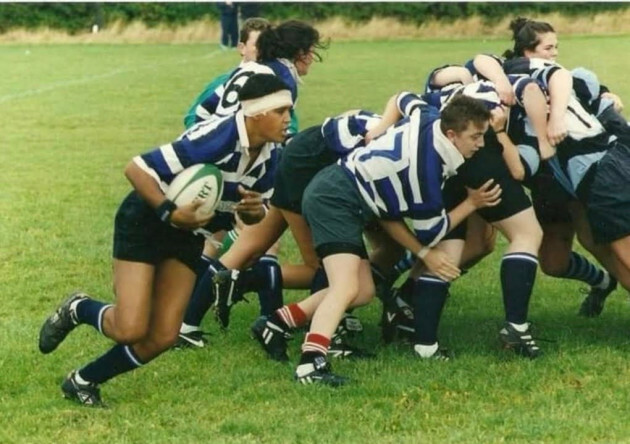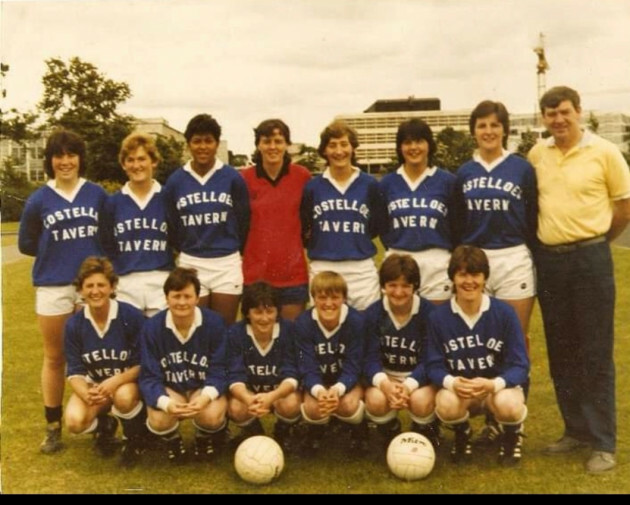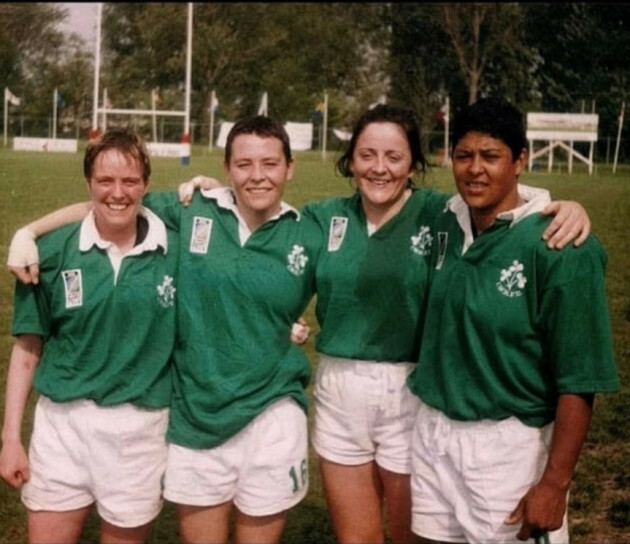
JACKIE MCCARTHY-O’BRIEN loves sport and has devoted a large portion of her life to it.
Born in Birmingham to an Irish mother and Jamaican father, she moved to Limerick before her first birthday and has spent most of her time there since.
She was talented enough to represent Ireland — 13 times each in soccer (1981-1993) and rugby (1994-1998) — becoming the country’s first mixed-race player in both games.
At 61, McCarthy-O’Brien remains an avid sports fan but she has not been tuning in to the 2022 Qatar World Cup.
She has been horrified by the controversies surrounding migrant workers, while as an openly gay person and a tireless LGBTQ+ advocate, she is appalled too by Qatar’s well-documented adverse treatment of homosexuals.
“I’ve made a decision not to watch it because I think it’s a travesty,” she tells The42.
“If you’re asking players to go over and take part in a tournament, I completely understand that there could be a guy there, it could be his last year playing, and every soccer player’s goal would be to make it to a World Cup.
“So to take that away would be so disheartening, and it’s the pinnacle of some players’ careers.
“But if we don’t stick together as people [it’s a problem] and I think maybe even boycotting it would have been a bigger statement.
“To me, it’s putting a trophy in front of human rights.”
She continues: “Qatar was announced years ago. There was plenty of time to do the protests then.
“I think if a few of the countries stuck together and said: ‘Look, whether we qualify or not, we’re not going,’ it could have made a huge difference.
“There are players there that could have brothers, sisters, aunts, uncles, that are gay. And I would imagine there was conflict within their families because of them going.”
McCarthy-O’Brien acknowledges it is easier for her to be critical as an ex-player speaking with a degree of distance, but she can also point to situations in her own career where she was willing to take a stand for the greater good.
At an early age, she experienced racism having been put in an industrial school “because I was black”.
Initially, she admits to being less vocal in speaking out about racism and standing up for the gay community, but gradually, McCarthy-O’Brien became more confident in using her voice to confront injustice.
She cites one particular anecdote as an example where she overheard a coach making a racist comment ahead of a big match.
She decided to take a stand, refusing to travel up to the game in Belfast unless the coach was discarded. This stance caused a rift within the team, but several important players in the team backed her up, and eventually, they agreed to travel without the manager in question.
They won the game in the end, though not everyone was happy, with certain teammates chastising McCarthy-O’Brien for not overlooking the issue and accusing the player of “making it about you”.
“You imagine at the end of it when we did win a cup match, winning the cup, that medal would have meant nothing to me,” she adds. “How do I look at my children? ‘Well, you know what, I went up and I kicked the ball around for this medal. Here you go. But the guy that was with us thinks that you and I aren’t as worthy as white people.’ Because that was what the comment alluded to.
“So I took a stand on that. It was hard to do it. I knew I was going to get a bit of a backlash, that people wouldn’t understand why I was doing it. But in the long run, I think when we went up there and played without a manager, and we did so well, they could see: ‘We’re a team and at the end of the day, teammates have to stick together.’”
McCarthy-O’Brien is accustomed to encountering hostility. She began playing team sports as a youngster in the 1970s and was in her forties by the time she retired in the 2000s. So in addition to being perceived as “the black kid” in an Ireland that had yet to truly embrace multiculturism, she came of age in a country where homosexuality was illegal.
“When I played soccer, I would say, half the team, if not more, were gay,” she recalls. “And this was in the early days when you just didn’t come out. Probably a few would know that so and so was seeing so and so. But we came together as a team and the heterosexual people knew as well and we became like family.
“The funny thing was, we found more and more young girls coming to our matches. And years later, a few of them approached me and said: ‘You made it easier for me to come out.’ And I was like: ‘Why?’ ‘Because we could go to your matches, and watch you being openly gay, knowing who was with who. And your teammates who were straight were 100% behind you.
“So in women’s soccer, it seems to attract gay people. I think the visibility of openly gay couples playing the sport made it easier for the younger generation to come along and follow them and go: ‘Well, if they can do this, and they’re known to be gay, I can.’
“So, really, I never experienced homophobia with my teammates or with management or anything else like that. What you might get is some of the opposition supporters giving the odd little jab, but in women’s sports in general, it is a lot easier to be openly gay.”
Moreover, with homosexuality only decriminalised in Ireland in 1993, for much of McCarthy-O’Brien’s career, the football pitch served as a brief respite from an antagonistic society.
“There was a safety element in it. We didn’t have gay clubs, we didn’t have gay bars, and there was nowhere to go where you felt comfortable.
Reports From Qatar
Get Gavin’s exclusive writing and analysis from the 2022 Fifa World Cup
“Even if you wanted to dance with your partner, you wouldn’t do that in a straight disco. So it took a long time for there to be safe zones. And I suppose sport was one of those ones where you could maybe hide a little bit, but be yourself at the same time, if you understand what I mean.
“It just attracted like-minded people. And you felt you weren’t the only one because being gay is seen as a dress sense. It’s seen as being a tomboy, and everything else like that. So when you saw somebody else like that, you didn’t feel alone, you were not the only one.
“I think the love of the game, as well, was a big draw for anybody but definitely, within the gay community, it seemed to be a little bit more accepted.
“And funnily enough for women’s sport, the guys seem to appreciate if you could play soccer, you could go out to the park on a Sunday and kick a ball around. And I think it did break down the barriers for others to say: ‘Look, she’s a good soccer player, but she’s no different from anybody else.’”
While homosexuality is still considered taboo in men’s football, as evidenced by the absence of openly gay players at the elite level, in the women’s game significant progress has been made to the extent that there have countless examples in recent years of gay players who are comfortable with being open about their sexuality in public spaces — current internationals Katie McCabe and Ruesha Littlejohn are the most high-profile examples from an Irish perspective.
And McCarthy-O’Brien was one of many athletes who helped pave the way for this era of inclusivity in women’s sports.
“It’s actually embraced now,” she says. “It’s seen as: ‘This is the norm here. Look, they’re no different.’ I suppose, back in the day, you wouldn’t be held up as a role model, if you were gay. Now, they’re at the forefront. And as it should be.
“One particular girl told me years later that she wasn’t allowed to play with our team because her mum felt it wasn’t a good influence or place for her to be with so many of the team being gay. What the mum didn’t understand was that girl was drawn to it, because she herself was gay.”
But while McCarthy-O’Brien has been encouraged by contemporary developments, she is not naive enough to believe the battle for equality and acceptance has been won.
Widespread prejudice still exists and the former player encounters this on a regular basis. She posts videos on TikTok in support of the LGBTQ+ community and to promote awareness of their struggles. Trolls invariably respond, asking offensive questions like “why isn’t there a straight pride week,” thereby representing a symptom of a wider societal malaise.
Yet despite these problems, McCarthy-O’Brien considers herself an optimist with regard to the future.
“I have children who are very open about who I am, they’re proud of who I am. I never hide my sexuality. I don’t flaunt it in people’s faces. But if somebody says to me: ‘How is your boyfriend?’ I say: ‘Sorry, no, I’m gay.’
“I won’t shy away from it. And I think we’re doing that more and more as families to educate the younger children. My grandson is six years of age. I had a conversation with him, only yesterday about his aunt, who was gay. And he was saying: ‘How they can be together, two girls can love [each other] and two boys — something must have come up in school. And I said: ‘Sure your family is like that anyway.’ And he was like: ‘That’s what I told them.’
“More and more gay people are having children, they are going to be picking their children up from the schools, they’re educating the teachers on Mother’s Day, they’ve got two mommies or two daddies, it is little things like that are going to change the perspective of the teachers as well. And it will become the norm.”











